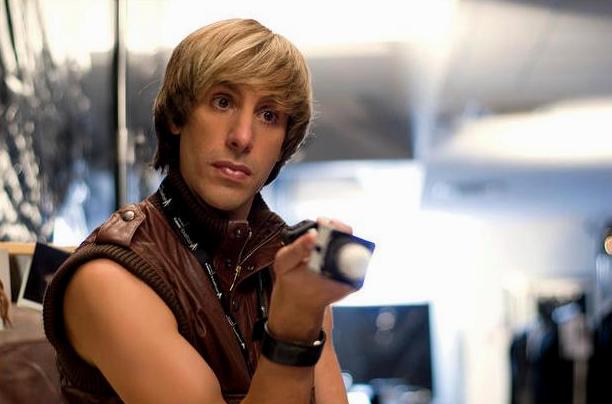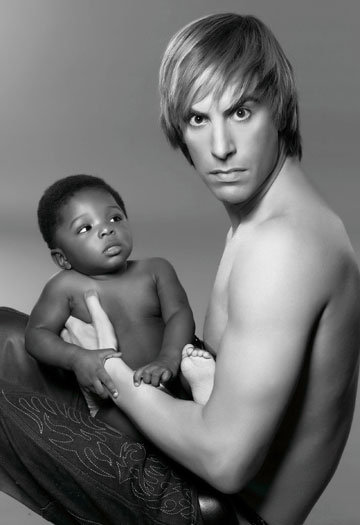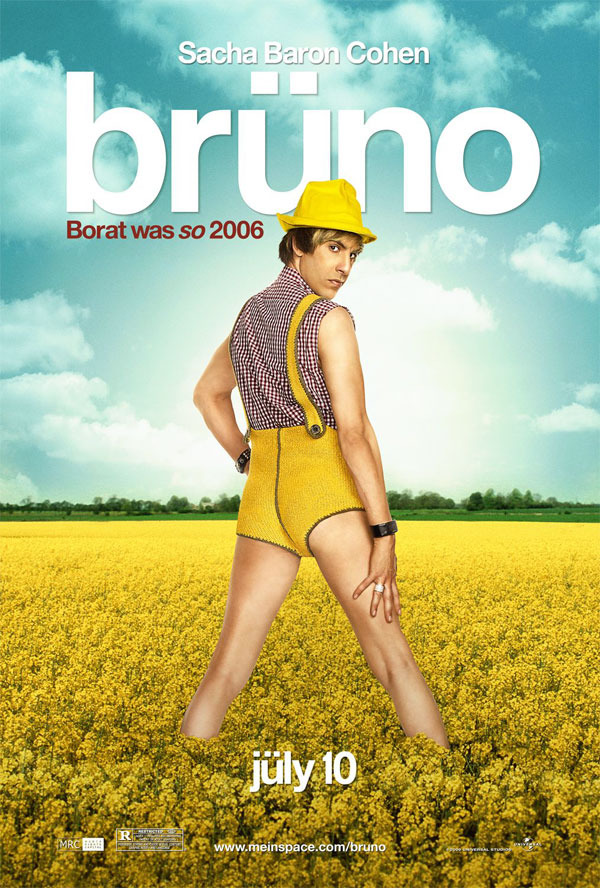
True acclaim will come late in the decades ahead. Actor and avante-garde performer Sacha Baron Cohen catapults his title creation Bruno to a new heightened standard of offensiveness, an apex of unbridled offensiveness that somehow will make the film a landmark in cinematic daring in the years to come. It is not a big eye-opener to say that shock comedy has become the key essential formula in the last decade, but the shock comedies that have struck box office gold are for the most part puerile with no underlying satire or sociological insight. Leave it to Baron Cohen’s genius to pry the shock humor technique open and find within it some revelation.
The surface joke obviously is that Baron Cohen’s character is a flaming homosexual that invades the space of unsuspecting Americans, many are interactions with celebrities we recognize. After being ousted from the European fashion industry, Bruno flies to America with the obstinate plan to become a movie star with gay Lutz (Gustaf Hammarsten) as his assistant. He wants more than anything to become the biggest Austrian superstar since Adolph Hitler. Even if it means he has to become “straight” to make it famous.
 Tastelessness and lewdness are not usually terms that draw me into a movie, in fact I usually recoil. There were times I covered my eyes in outrage, covered my eyes in terror, and covered my eyes in shame. How is one supposed to react when the gay hero adopts a baby and names christens him with the “traditional” African-American name O.J., then goes on the “Richard Bey Show” to a crowd of shocked spectators who willingly walk out before the end of the taping (somehow they didn’t expect before attending the show that they were going to be outraged? I mean, it’s the “Richard Bey Show!”).
Tastelessness and lewdness are not usually terms that draw me into a movie, in fact I usually recoil. There were times I covered my eyes in outrage, covered my eyes in terror, and covered my eyes in shame. How is one supposed to react when the gay hero adopts a baby and names christens him with the “traditional” African-American name O.J., then goes on the “Richard Bey Show” to a crowd of shocked spectators who willingly walk out before the end of the taping (somehow they didn’t expect before attending the show that they were going to be outraged? I mean, it’s the “Richard Bey Show!”).
And how is one to not cringe in dread at the sight of the gay hero interviewing the head of an Islamic terrorist group (for real) and insulting his haircut and lack of fashion before getting righteously political. And how is one not to cover up in shame while anti-gay activist Paul Cameron insists to our gay hero Bruno that he should accept that women are boring and that in conversation they go off in disconnected tangents, but it is all God’s plan to mate with them.
I correct myself with the assertion that Bruno is not a hero: he’s obscene, uncivilized and ignorant. But I would like to think that Sacha Baron Cohen is a hero. For anybody that has seen his previous 2006 hit “Borat” knows that Baron Cohen assumes himself into live situations on unsuspecting people, with the legend that his collaborator, director Larry Charles, gets people to sign off on a waiver for the right to be filmed. His targets are gullible for not seeing past the buffoon act.
What concedes are raw moments with a sanctimonious pastor trying to deprogram Bruno’s homosexuality, moments with Arkansas hunters as fuming bigots, moments with superficial Hollywood agents and publicists, and moments of hypocrisy where he prances flamboyantly into a down south “God Hates Fags” demonstration where none of the protestors have the balls to counterstrike their encounter. There’s also a desperate moment with former presidential candidate Ron Paul who is hesitant and tactless to escape now! that you have to wonder how could he have possibly navigated a country when he can’t even foresee an unwanted gay come-on.
 Audience fascination is indisputably challenged by this parlor game of guessing whether that’s real or if that’s staged, which is all wrapped inside Baron Cohen’s quasi-documentary method. In the majority of the time “Borat” was unrehearsed and spontaneous but you can tell here and there what parts were scripted. “Bruno” is far more invisible in its guerilla practice, in fact, most the social interaction scenes are authentic encounters. It’s less quasi-documentary this time than borderline documentary with Bruno as the fixed constant and mass American culture as the unpredictable variable.
Audience fascination is indisputably challenged by this parlor game of guessing whether that’s real or if that’s staged, which is all wrapped inside Baron Cohen’s quasi-documentary method. In the majority of the time “Borat” was unrehearsed and spontaneous but you can tell here and there what parts were scripted. “Bruno” is far more invisible in its guerilla practice, in fact, most the social interaction scenes are authentic encounters. It’s less quasi-documentary this time than borderline documentary with Bruno as the fixed constant and mass American culture as the unpredictable variable.
By the time we get to the Swingers Party scene, I had believed for at least a minute that it was one of the film’s few pre-fabricated scenes until with dumbfound realization that what was happening on screen was really happening with real people. Spoiler Note: the genuinely dirty-decadent and debauched sequence gets a tacked on fake conclusion. The crew certainly went back to Hollywood, built a set that looked like the house they were at, had one actress in on the joke, to create a scene where the she-dominatrix lashes Bruno.
Built-in the very loose script is a love-hate relationship between Bruno and his partner Lutz, so erratic is their affair that they eventually end up in an Arkansas wrestling cage that starts as straight man-warrior fighting then turns gay (the barb-wire must have served as defense from fundamentalist Christian spectators). There has been criticism by the way by other journalists that the script and story are very flimsy and undernourished. Like who cares! From an erotic escapade that’s far too scatological to pantomime oral sex, from dildo swatting to babies dressed up as Nazis, “Bruno” pushes the envelope. The story “outcome” is second fiddle to Baron Cohen’s experimental provocateuring.
You could argue that “Borat” is funnier with way heartier laughs, but “Bruno” has got to be the greater movie – albeit by a close margin. You will laugh, you will wince, you will find some of it intolerable, you will find some of the graphic nudity to be traumatizing, you will find some of it, just, impossible, as in no way! Eruption of laughter met with cold silence met with outrage met with hysterical shivers. What makes “Bruno” a pinnacle comedy of its time is that it covers all of our prejudice and intolerant moral bases in society and then impels us to ask how much we can really take? It’s a litmus test as well as entertainment (many will turn it off before it is over). Depraved and influential for better or worst, “Bruno” is going to be the defining shockfest of our time. Avante-garde goes mainstream and for sure it’s a shockfest landmark. Will probably sink in to the classic lexicon in maybe a decade from now.
81 Minutes. Rated R.
COMEDY / MOCKUMENTARY / LATE NIGHT SHOCKS
Film Cousins: “Pink Flamingos” (1972); “This is Spinal Tap” (1984); “A Dirty Shame” (2004); “Borat” (2006).





